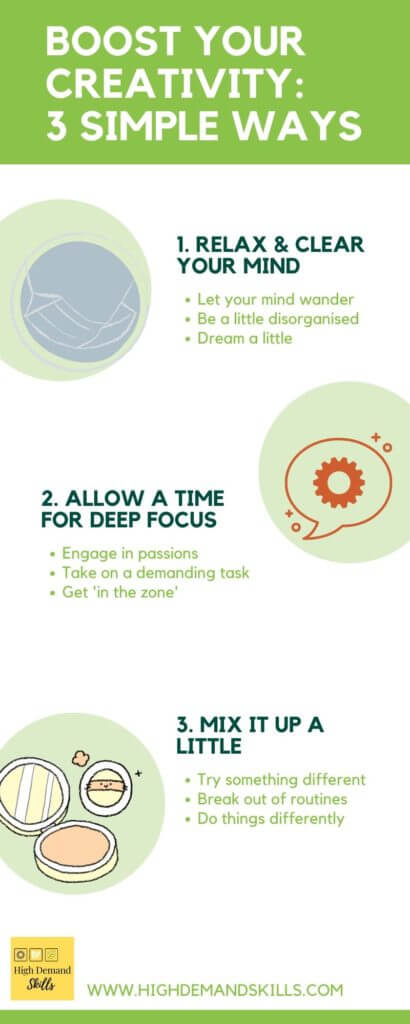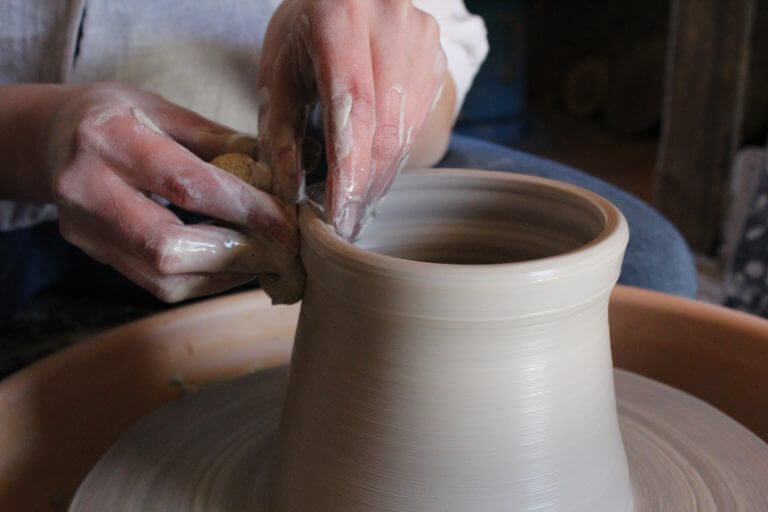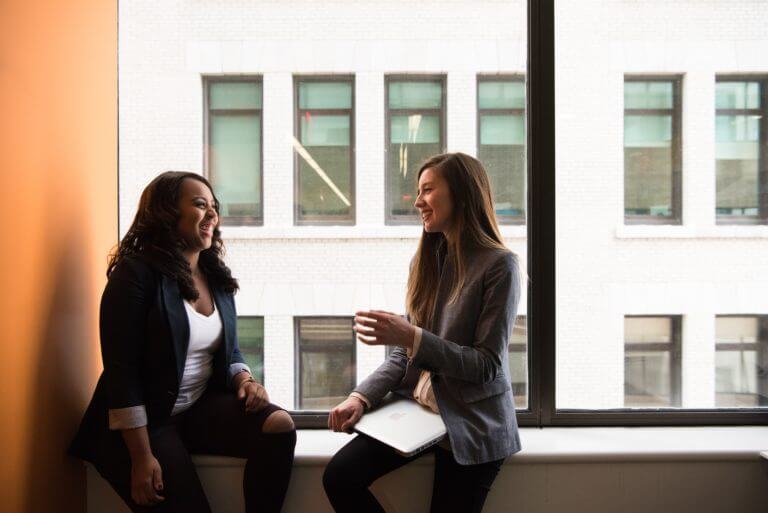3 Simple Things You Can Do to Boost Your Creativity
Creativity reflects imagination and originality and is highly sought after by employers. It also helps to reduce stress, increase focus and improve well being. So, how can we cultivate a bit more creativity in our lives? Here are three simple ways.
LinkedIn ranked creativity as the top soft skill sought by companies in 2020. According to McKinsey, a global consulting firm, this demand is likely to grow, especially with the increased adoption of automation and artificial intelligence by businesses.
So, what is creativity?
The Oxford Dictionary defines creativity as “The use of imagination or original ideas to create something; inventiveness”.
Global recruiter Hays considers creativity to be a combination of thinking and producing.
McKinsey classifies creativity as a higher cognitive skill, a category that includes advanced literacy and writing, critical thinking, and complex information processing.
What’s more, staffing agency Artisan Talent points out that research shows creativity leads to lower stress, better emotional awareness, and improved focus and well-being.
Creativity, therefore, captures the notions of imagination and originality and can produce genuine benefits in your life and work. It’s clearly worth cultivating, and the following simple and effective practices will help boost the creativity in your life.
1. Find a time to relax and clear your mind
Do you enjoy a relaxing coffee break at your local cafe? Or perhaps a long walk, or a meditation session?
A rejuvenating shower is where some find a few moments of inspiration.
Whatever your preference, it’s important to take some time to do what clears your mind, allows it to wander, and makes you feel relaxed. This sets up a ripe environment for creativity.
Karen Young, Director of Hays UK, a global recruitment firm, says you’re likely to have your best and brightest ideas when your mind is “elsewhere”.
Dr. Rex Jung, from the University of New Mexico, explains how this works, based on his research into the brain’s frontal lobes.
The frontal lobes normally organize thoughts and direct ideas into ’intelligent’ thought patterns.
Creativity, on the other hand, thrives when the frontal lobes hold back a little, allowing a more meandering, less organized pattern of thoughts to emerge. This lets ideas link together in unexpected ways, boosting creativity.
Sleep, and dreaming, also help to improve creativity. Here too, if the brain is relaxed and not hampered by the “organizing power” of the frontal lobes, creativity can flow.
Dr. Melissa Burkley discusses research that describes sleep as a time when the brain treats information differently, allowing new and insightful ideas to appear. This is why some people find solutions to their problems simply by “sleeping on it”.
2. Engage in activities that avoid distractions, allowing you to focus deeply
Do you have a hobby that you’re passionate about? One that gets you “in the zone”?
Or perhaps at work, are there certain tasks or projects that capture your attention deeply?
This is a good state of mind for creativity according to Dr. Cal Newport. He describes this as “deep work”.
Deep work is the “ability to work consistently at a demanding task using complete focus and without any distraction”.
When practiced regularly, deep work boosts creativity.
It comes with its challenges though, particularly given the distractions that invade our modern lives. How easy is it to turn off your cell phones, for instance, for a few hours each day?
Dr. Newport suggests that deep work requires scheduling, focus, and concentration. It requires effort, but it’s also rewarding, boosting better productivity and creativity.

3. Mix it up a little
Originality is fundamental to the creative process.
When we run our lives by established routines we sometimes fall into a “rut”. This suppresses original thinking and stifles creativity.
Priscilla Chapman, in a recent Harvard Business Review article, says “people in a rut can develop habits that kill off their own creativity”.
One way to avoid this is to do things differently, break up routines or try something new. This means being open to change.
According to Ruth Sacks, principal lecturer at Westminster Business School, change can lead to threats as well as opportunities. Sacks suggests that making mistakes is an important part of the process.
Organizations such as IBM have embraced this concept by encouraging experimentation in their staff. In IBM’s case, this followed feedback from a survey that highlighted the importance of creativity in dealing with change.
Samantha Harrington talks about diversity as another important factor in encouraging creativity, through the different ways of thinking that diversity promotes. Diversity comes from people with different backgrounds, perspectives, or experiences.
Conclusion
Creativity has long been an important feature of human society and is becoming more recognized for its importance in the workplace.
By building creative habits into your lifestyle, you can help boost this highly sought-after skill and reap the benefits at work and at home.




